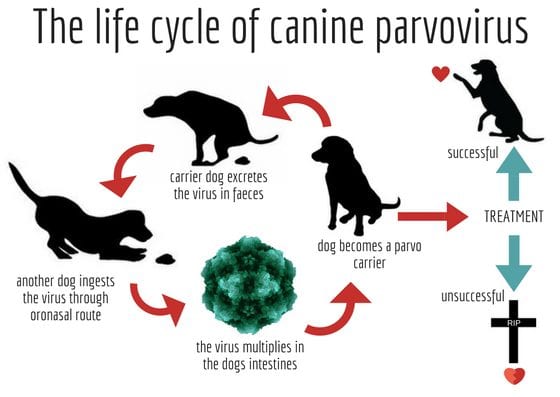What Every Pet Parent Needs to Know To Prevent Parvo
Canine parvovirus (CPV), is most commonly referred to as parvo. It’s a very contagious and aggressive virus that causes an infectious gastrointestinal illness (GI), and in some instances can cause lifelong damage to the heart muscle. The most common form of CPV is intestinal, causing many unpleasant and even dangerous symptoms that often require hospitalization and 24-hour monitoring. Parvovirus can also be lethal for your pet.
So where does parvo come from in dogs, and how do you catch it?
Parvovirus is spread from dog to dog by direct or indirect contact with feces. That means that your dog can get parvo from eating an infected dog’s poop or simply sniffing an infected dog’s hindquarters! Keep pets away from feces, and always pick up and dispose of their poop – it’s good manners, and helps prevent the spread of potential diseases. Make certain your pets are current on all of their shots before they are exposed to other dogs.
How to Prevent Parvo in Puppies
Puppies, adolescent dogs, and canines who are not vaccinated are most susceptible to the virus. Parvo can be especially hard on puppies who haven’t yet been vaccinated because their immune systems haven’t yet fully developed. Make certain your pup is current on all of their shots before they are exposed to other dogs. Puppies need to undergo a series of vaccinations and boosters during their first year of life. Puppy shots usually begin between 6-8 weeks of age to help boost the development of their immune system. Additional vaccines and boosters will be necessary every 3-4 weeks until the puppy reaches 16-20 weeks of age. The vaccine schedule will not be the same for every pup, so consult your veterinarian.
What is the First Symptom of Parvo?
Lethargy is a common base symptom, but it can indicate any number of health issues, so you’ll need to watch for other symptoms. Dogs that are infected with the parvovirus will often experience severe vomiting, loss of appetite, and foul-smelling or bloody diarrhea. If you notice these or other symptoms, seek immediate veterinary care for your pet.
What Do Dog Vaccinations Prevent?
Vaccinations are vitally important to the health of pets. According to the ASPCA:
“Vaccines help prevent many illnesses that affect pets. Vaccinating your pet has long been considered one of the easiest ways to help him live a long, healthy life.”
The core vaccines recommended for dogs include:
- DHPP Vaccine – This vaccine is used to protect your pet from 4 potentially fatal but preventable diseases (Distemper, Hepatitis, Parainfluenza and Parvo).
- Bordetella Vaccine – Bordetella is one of the more common causes of kennel cough/canine cough (infectious tracheobronchitis). The vaccine is also required by most groomers and boarding facilities.
- Rabies Vaccine – A vaccine that is required by law due to the risk to people. While rare, rabies can be fatal, so get your dog vaccinated.
Want to know more about core vaccinations and other vaccines that may be recommended for your dog? Visit our blog to learn more.
Now that you understand the importance of preventing parvovirus, here’s how we can help. Each of the AZPetVet locations offer affordable Puppy Vaccination packages. Have an adult dog? Be sure to ask us about our Free Vaccines for Life program which is designed specifically for adult animals. After a one-time enrollment fee, your pet’s core vaccines will be free for the rest of their life. All you must do to keep the benefits going is bring them in for their annual Preventative Care exam! Visit Free Vaccines for Life for more information on our program.
[DISCLAIMER] Not intended to be a substitute for professional veterinarian advice, diagnosis, or treatment. Always seek the advice of your veterinarian with any questions you may have regarding the medical condition of your pet. If you think your pet has a medical emergency, call or visit your veterinarian or your local veterinary emergency hospital immediately.


